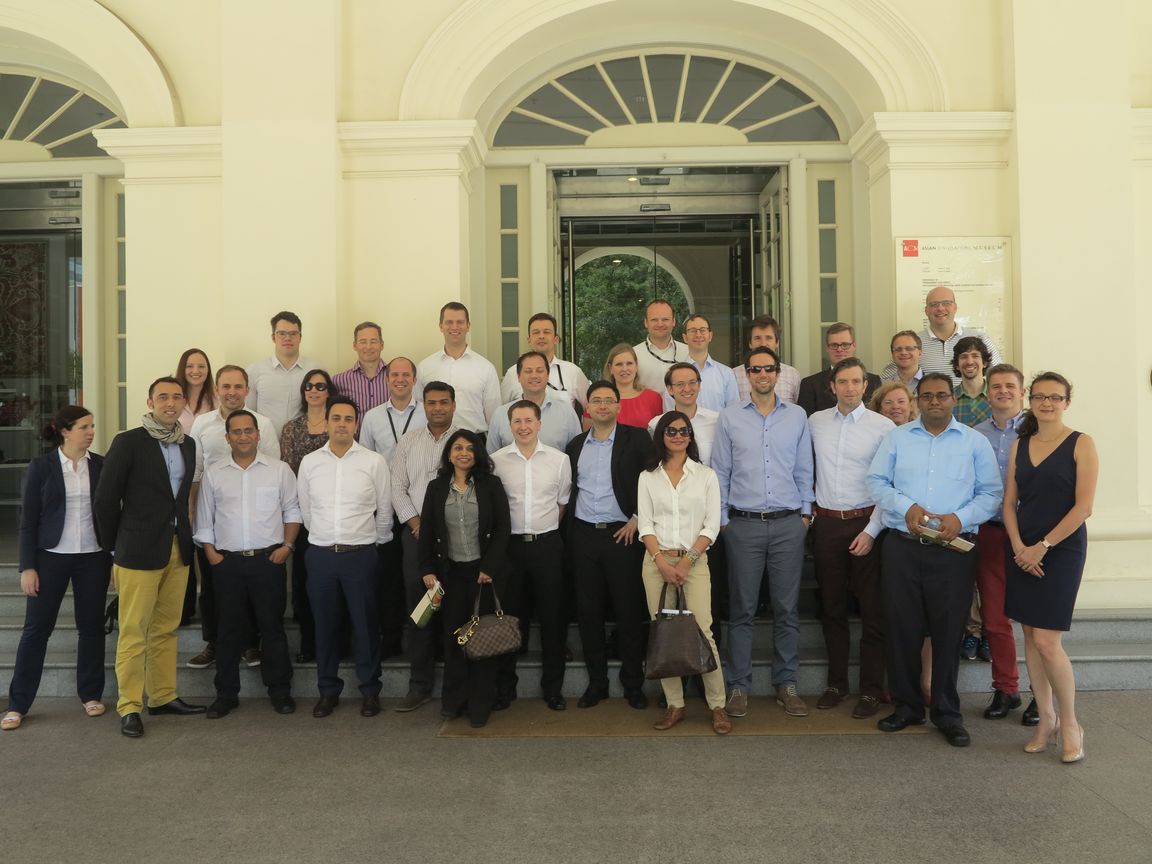Curriculum
Sie sind hier: Programme & Kurse » Executive MBA Programme für erfahrene Fach- und Führungskräfte » Mannheim Executive MBA (Part-Time) » Curriculum
Fundiert und Praxisnah
Vielfalt zieht sich an der Mannheim Business School durch alle Bereiche. Da machen die Curricula selbstredend keine Ausnahme. Daher sind die Herausforderungen, die auf die Teilnehmerinnen und Teilnehmer warten, ebenso vielfältig wie spannend. Kein Tag ist während des Executive-MBA-Programms wie der andere. Dafür sorgen schon alleine die vielen unterschiedlichen Programmelemente, die jedoch immer eines gemeinsam haben: sie sind fundiert, praxisorientiert sowie didaktisch und inhaltlich an die Bedürfnisse erfahrener Führungskräfte angepasst.
Core Courses
Economic Analysis for Business
The course gives an introduction to basic economic concepts and models that govern the economic environment in which businesses work (markets where firms retrieve their input and sell their output but also the national and international macroeconomic conditions). Participants are taught to analyze the environment and identify important economic factors influencing performance and behavior of firms and industries: An essential skill for managers to anticipate threats, avoid mistakes and realize opportunities.
Decision Analysis
Oftentimes, decisions have to be made in the context of multiple competing objectives and substantial uncertainties. Decision analysis has its roots in economic rational decision making theory and mathematical models about uncertainty and risk. However, judgement has been shown to be subjective and prone to behavioral biases and fallacies leading to research fields such as behavioral economics. This course discusses various concepts and enables participants to make better-grounded decisions.
Organizational Behavior & Leadership
Modern companies need managers capable of understanding and leading interactions between individuals, their teams and company culture. This course familiarizes with behavioral aspects of management including individual processes such as personality and motivation, team management and organizational issues, and leadership aspects. Main objectives are to develop diagnostic and analytical skills as well as improve inter-personal and leadership skills.
Team Management
As there has been a virtual explosion of knowledge leading to a strongly increasing complexity of processes, products and services, companies rely more and more on cross-functional and interdisciplinary teams. These teams potentially get more and better work done. Nevertheless, teams often fail to make full use of their synergistic potential. This course develops a theoretical understanding and delivers practical knowledge on how to lead teams and make use of their full potential.
Strategic Leadership
Today's top managers face a number of strategic leadership challenges such as organization restructuring and design, handling top management and board dynamics, and coping with burn out. This course aims at enabling participants to better understand the nature and dynamics of strategic leadership and at familiarizing them with techniques and principles of organization design as well as the reality of governance application.
Financial Accounting
The course aims at familiarizing the participants with the framework and basic concepts of financial accounting according to International Financial Reporting Standards (IFRS). This course extends to financial accounting and reporting from a leadership perspective. It enables the participants to understand the link between external reporting and internal decision-making.
Managerial Accounting
Managerial accounting provides information and control necessary for an organization's long-term competitive success. This class introduces terminology and concepts of managerial accounting including the use of cost information for decision making and management control systems. It teaches how to choose the relevant cost based information, use cost management methods and apply performance measurement systems.
Corporate Finance
Corporate finance is concerned with the capital structure of corporations, its objective being the increase of shareholder value. This course introduces terminology and fundamental drivers of value creation and modern financial management. It allows the participants to assess an investment proposal and critically analyze reports and recommendations by corporate finance consultants.
Marketing Management
In increasingly competitive and integrated markets, the role of marketing in a firm is changing and gaining more and more importance. By introducing fundamental marketing tools and concepts as well as presenting principal issues concerning the implementation of a marketing strategy, participants gain the understanding of how to effectively apply marketing concepts. The relationships between company, competitors and customers and the realm of the strategic setting that the company is operating in provide the framework for analysis.
Strategic Management
The fundamental question of strategy is how firms can gain and sustain competitive advantage in times of innovation, uncertainty and changing industry and firm boundaries. The course aims at enhancing the ability to define and analyze strategic problems and to identify sources of competitive advantage. It introduces various tools, concepts and analytical frameworks necessary for integrating variety of perspectives and thus developing skills in strategic management increasingly critical for a wide range of positions.
Operations & Supply Chain Management
Operations management is about analyzing, controlling and improving processes related to the company's product. During production, goods and services go through interrelated operations or processes. Supply chain management is concerned with all processes leading to satisfy customer demand. Managing interrelated product, financial and information flows typically include multiple players with their own objectives. Concepts and methods of operations and supply chain management are introduced to understand the increasing importance and appreciation of management decisions in this field.
Business Ethics
In today's private sector and public organizations, managers face a number of ethical issues and need to develop ethical competencies to work through these issues. This course gives theoretical and practical insights about ethics and leadership developing personal and professional awareness about individual and collective responsibility. As main objective, participants will be able to understand the meaning and relevance of ethics and how to effectively embed responsible practice within a company.
Study Trips
Gelebte Globalisierung
Den Horizont und das eigene Netzwerk erweitern, mehr erfahren über die Business-Kulturen in den wichtigsten Wirtschaftsmetropolen der Welt: Das bieten Ihnen die Study Trips. Insgesamt zwei fünftägige Aufenthalte in Nordamerika und Asien stehen auf dem Programm. Unsere Maxime: Sie sollen möglichst viel erfahren über die Besonderheiten und Erfolgsfaktoren der jeweiligen Region. Darauf sind Kurse, Gastreferate, Unternehmensbesuche und kulturelle Veranstaltungen abgestimmt.
Social Class Project
Verantwortung übernehmen
Verantwortung ist ein Grundwert der Mannheim Business School. Doch sie wird keineswegs nur in Kursen thematisiert, sondern auch aktiv gelebt. Bestes Beispiel dafür ist das Social Class Project, das fester Bestandteil des Curriculums des Mannheim Executive MBA ist. Dabei plant und realisiert jeder Jahrgang unabhängig und als gesamte Klasse „sein“ Projekt in der Metropolregion Rhein-Neckar, organisiert sich selbst und wendet dabei nicht zuletzt auch Management-Wissen direkt an. Die Liste der bislang realisierten sozialen Projekte ist eindrucksvoll und beweist: Sie sind nicht nur identitätsstiftend für unsere Teilnehmergruppen, sondern auch ein Signal, dass wir gerne und nachhaltig Verantwortung für die Gesellschaft übernehmen.
Strategic Project
Von der Idee zur Lösung
Das Strategic Project ist fraglos die „Krönung“ des Executive-MBA-Abenteuers: Schließlich bietet es die einmalige Gelegenheit, mit der eigenen Erfahrung und Kompetenz, neu gewonnenem Wissen und Methodenkompetenz in einer Kleingruppe ein Lösungskonzept für eine komplexe unternehmerische Fragestellung zu erarbeiten. Dabei haben Sie die Wahl zwischen einer realen Herausforderung innerhalb eines Unternehmens oder einem Business-Plan zu einer vollkommen neuen unternehmerischen Idee. Interdisziplinäres Arbeiten ist dabei unabdingbar. Selbstverständlich ist es, dass Sie während des Projekts von Experten aus der Fakultät und Praxis unterstützt werden.
Ansprechpartner









